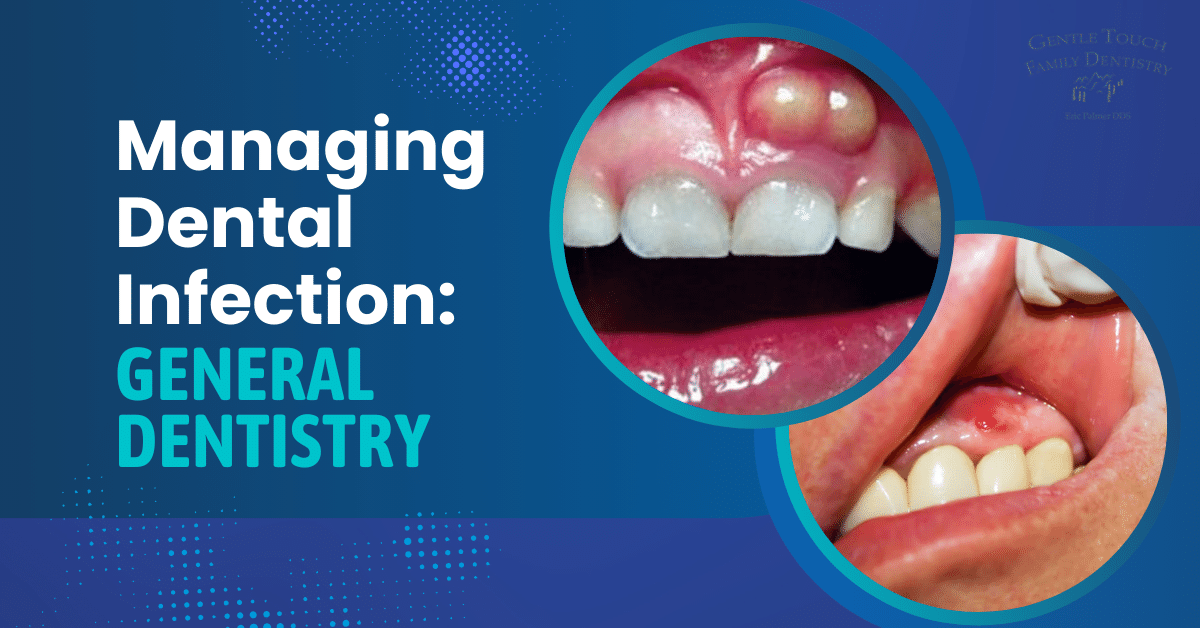
Dental infections are a prevalent issue that impacts a significant portion of our population at some point in our lives. Understanding how these infections are managed in general dentistry is crucial for patients and practitioners.
How Do General Dentistry Expert Manages Dental Infections In Their Patients?
General dentists play a pivotal role in managing dental infections. Their approach typically begins with a thorough assessment of the patient’s oral health to identify the source of the infection. Once diagnosed, treatment options may include:
- Prescribing antibiotics to fight the disease.
- Performing a root canal for infections in the tooth’s pulp.
- Extracting the tooth if it’s beyond salvageable.
The dentist aims to eliminate the infection, alleviate pain, and prevent further oral health issues.
What Are The Common Signs And Symptoms Of Dental Infections That Prompt Individuals To Seek General Dentistry Care?
Recognizing the signs and symptoms of dental infections is vital for timely treatment. Common indicators include throbbing toothache, sensitivity to hot or cold, swelling in the cheek or jaw, bad breath, and sometimes fever.
These symptoms often prompt individuals to seek care from a general dentist. It’s important to note that some dental infections can progress without causing pain; hence, regular dental visits are crucial for early detection and treatment.
Recognizing the Signs and Symptoms of Dental Infections
- Throbbing Toothache: This is often the most noticeable and discomforting symptom. The pain can range from mild to severe and may intensify when eating or drinking, especially when consuming hot or cold items. The toothache is usually persistent and can radiate to the jaw, neck, or ear.
- Sensitivity to Hot or Cold: This symptom manifests as a sharp, acute pain when the teeth are exposed to extreme temperatures. It’s a telltale sign that the nerves within the tooth may be affected by infection or decay.
- Swelling in the Cheek or Jaw: This is a physical manifestation of an infection. Swelling can occur in the gum area around the affected tooth or spread to the cheek and jaw. This swelling is often accompanied by tenderness, making it uncomfortable to chew or open the mouth fully.
- Bad Breath or Unpleasant Taste: Dental infections can cause a persistent bad taste in the mouth or chronic bad breath that doesn’t improve with brushing or mouthwash. This is due to the bacteria present in the infected area.
- Fever: While not as common, some individuals may develop a low-grade fever as the body tries to fight the infection. This systemic response indicates that the infection might be more serious or spreading.
- Gum Redness and Bleeding: Infected gums may appear more red than usual and bleed during brushing or flossing. This sign should not be ignored as it may indicate progressing periodontal disease.
- Pain When Chewing: Pain or discomfort when applying pressure to a tooth, such as during chewing, is a common symptom. This could be due to infection weakening the structure of the tooth.
- Loosening of the Tooth: In more advanced cases, the infected tooth may begin to loosen. This is a severe symptom, indicating that the infection has potentially spread to the supporting bone structure.
- General Discomfort, Illness, or Lymph Node Swelling: In some cases, dental infections can cause a general feeling of malaise or illness. Swollen lymph nodes under the jaw or neck can also occur as the immune system battles the infection.
The Importance of General Dentistry Timely Intervention
Individuals must be aware of these symptoms and seek prompt dental care. Dental infections can progress silently and become severe without early intervention. Regular dental visits are essential because a dentist can often spot early signs of infection before the patient feels any symptoms. This early detection is key to preventing more serious complications, such as spreading the infection to other parts of the body or losing teeth.
Can Untreated Dental Infections Lead To More Severe Oral Health Issues, And How Are They Managed By General Dentists?
If left untreated, dental infections can lead to more severe health issues. These complications may include abscess formation, spread of the infection to the jawbone or surrounding tissues, and, in extreme cases, systemic infection.
General dentists manage these complications by first addressing the source of the infection and then treating its consequences. This might involve more complex procedures like surgical intervention to drain abscesses or extensive restorative work to repair damage caused by the infection.
Are There Specific Dental Treatments And Procedures Within General Dentistry That Are Used To Address Dental Infections Effectively?
General dentistry encompasses various treatments and procedures to address dental infections effectively. The most common include root canal therapy, used to treat infections within the tooth’s pulp, and tooth extractions for severely infected teeth.
In addition, periodontal treatments may be necessary for infections affecting the gums. Dental fillings, crowns, or implants may be used post-treatment to restore the tooth’s function and appearance.
What Is The Importance Of Regular Dental Check-ups In Preventing And Managing Dental Infections Through General Dentistry Care?
Regular dental check-ups are fundamental in preventing and managing dental infections. These visits allow general dentists to detect potential problems early, often before they become symptomatic.
Regular cleanings remove plaque and tartar build-up, reducing the risk of tooth decay and gum disease, common causes of dental infections. Additionally, dentists can provide valuable advice on oral hygiene practices and lifestyle changes to help maintain optimal oral health.
Managing dental infections is a multifaceted task requiring general dentists’ expertise. By understanding the signs and symptoms, being aware of the potential complications, and knowing the treatment options available, patients can work alongside their dentists to ensure good oral health.
Regular dental check-ups play a critical role in this endeavor, helping to prevent and manage dental infections effectively. As always, maintaining good oral hygiene and seeking timely dental care is key in combating dental infections.
FAQs About Dental Infection
Q: What should I do if I suspect a dental infection?
A: Contact us immediately for an appointment. It’s crucial to treat dental infections early to prevent complications.
Q: Are dental infection treatments covered by insurance?
A: Many dental insurance plans cover infection treatments. We can assist you in understanding your benefits and provide a cost estimate.
Q: How often should I visit for a dental check-up?
A: We recommend a check-up every six months, which may vary depending on your dental health needs.
Q: Can dental infections be prevented?
A: Yes, with good oral hygiene and regular dental visits, many dental infections can be prevented.
Q: Is treatment for dental infections painful?
A: We use the latest techniques and anesthesia options to ensure your comfort during treatment. Pain management is a top priority for us.
Trust Us to Address Dental Infection
Don’t let dental infections disrupt your life. At Gentle Touch Family Dentistry, we ensure your dental health is in the best hands. Contact us today to schedule an appointment and experience dental care that’s gentle, effective, and tailored to your needs.
Remember, your smile is our priority, and we’re dedicated to keeping it bright and healthy!



